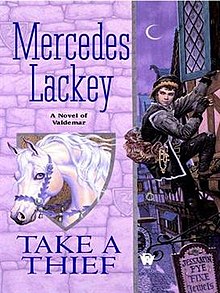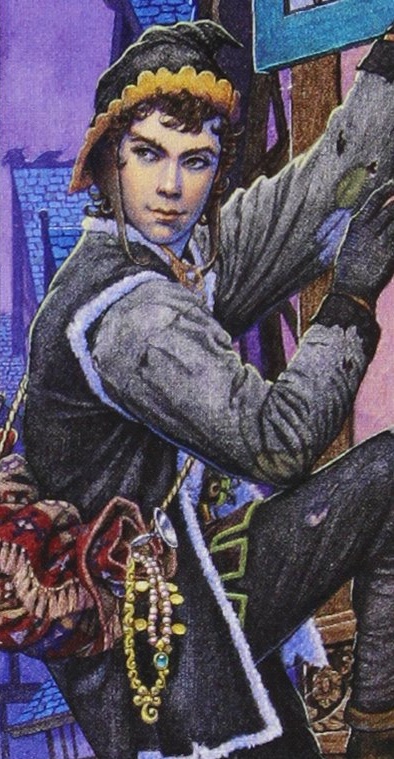Welcome to the last book review of #ReadingValdemar in 2020! Confirming with the schedule below, there will be a wrap-up post in December, though that may look different from the one in 2019, as my reading buddy, Jackie @ Death by Tsundoku, will have a newborn. We’ve been wishing for this baby for years. In fact, I bought the pending wee one a knitted hat a few years ago. If you build it, they will come — that’s what my heart said, anyway.
Take a Thief is the third book in the Exiles of Valdemar trilogy. Weaponsmaster Alberich’s two books were bound with this one because both Alberich and now Skif, the titular thief, are not “Herald material” on the surface. Interestingly, Skif’s story begins years before he is Chosen to become a Herald trainee. The novel commences like a cross between Harry Potter and Oliver Twist. Skif lives under the stairs at his cruel uncle’s inn. He’s barely viewed as human, but thanks to a new law by the Queen, all children must attend school until they can read, write, and figure to the teachers’ satisfaction. Skif’s trouble is sums, though he’s not working hard at it. School breakfast is the only meal he’s guaranteed each day, so why mess up a good thing?
A crummy inn owner who cuts corners in every way possible, especially with recycling food between patrons, Skif’s uncle has his hand in the dark side of Valdemar, but stays out just enough to avoid getting “burned.” Until one day there’s a raid on his inn by those who are angry with the landlord and his bully son, and Skif catches wind what will happen. Rather than warn his neglectful family, he runs away.
Eventually, Skif is take in by Bazie, a double amputee veteran of the Tedrel Wars who is skilled at sewing and recognizing fine linens, and has invaluable knowledge about thieving. Bazie’s small collection of boys who train under him, live together, and share all they steal is the best family Skif has ever had. Until one night someone obviously burns down the building with all its tenets when Skif isn’t home, and his family is gone. The next year sees Skif consumed with revenge, and he’s pretty good at finding information and sneaking around. Although Skif is skilled at lifting off folks (“you’ve got to pick a pocket or two“), his real talent is in roof walking — getting into and out of places from up high.
Skif’s spying and planning cause him to run into Alberich when the Herald is in disguise. Even before Skif is Chosen, Alberich recognizes the boy’s talents for hiding, creeping, and eavesdropping. It seems they’re trying to find the same person for different reasons: Skif for the fire, and Alberich because the villain is also running a child trafficking ring.
Spending so much time with Skif before he’s Chosen to become a Herald gives readers a better look at the flaws of Valdemar. It’s easy to see the kingdom as a place of perfect peace and harmony because Heralds are so fair and righteous. However, Skif’s time spent near Exile’s Gate shows the underbelly of the city, an area we’re told Heralds don’t really go. Why not? Is the Queen so unaware of corruption and poverty? Does she spend too much time trying to please her court of highborn? That may be just it. After Skif’s adopted family is murdered, he swears revenge on all highborn because they have so much while so many have nothing. He dreams of what he can easily do:
Just wait until they all came back from their fancy country estates! . . . not just to things gone missing, but to cisterns and sewers plugged up, wells and chimneys blocked, linens spoiled, moths in the woolens, mice in the pantry and rats in the cellar! He’d cut the sash cords, block windows so they wouldn’t close right, drill holes in rooftops and in water pipes. It would be a long job, but he had all summer, and when he got through with them, the highborn of Valdemar would be dead certain that they’d been cursed by an entire tribe of malevolent spirits.
And though it may seem like Skif is being petty because he thinks life is unfair, the wealthy families of Valdemar actively try to keep those in poverty away. After the highborn make a plea with city guards to drive the poor back to the slums, a Priory points out to Skif that “the alleyways are public thoroughfare; they do not belong to the highborn. Neither is the Guard answerable to those with noble titles who are discomfited by the poor outside their walls.” This was a poignant moment during which Lackey suggests titled people in Valdemar are similar to readers today: while we don’t want homelessness to be an issue, we’re quick to suggest the mayors of our cities remove the “blight” that is human suffering from street corners and doorways (or, in the case of my city, underpasses and patches of grass). Issues of class and inequality are crystal clear in Take a Thief, in a good way.
Skif’s character is full of heart and logic, but he has dignity, too. After he is Chosen and begins training to be a Herald, he crafts a plan to get the other trainees to accept a thief in their midst. Most trainees are “obviously” worthy when they arrive, and some do come from stable families and money. Skif feels he must win the others over, but doesn’t become a victim, either. Dirk, for instance, pities Skif, asking, “But how did you live? . . . How did you manage to survive?” All during this time, Skif is picking Dirks pockets for fun and then replies, “I turned into a thief, of course” and reveals all of Dirk’s personal possessions in his hand! Lackey doesn’t hold back on Skif’s suffering, but she never writes him as pitiable, either.
I was sure there would be drama around Skif entering the Collegium to train to be a Herald. Previous protagonists have been tormented, thrown in freezing rivers, nearly trampled to death, and more. But Take a Thief is the first book in which Lackey shows us that when a person is Chosen, it’s not because he/she is so very good and big of heart, but because the new person fits the needs of the kingdom at that time. Sort of like Darwin’s “survival of the fittest,” Heralds continue to be Chosen based on what attributes they have that will make the kingdom safer and more prosperous. I appreciated that Lackey stripped away the heart of gold stuff and made Take a Thief a more realistic book that looks at the hardships of any place, and how surviving is a skill that applies widely.





I, too, found Lackey’s observation about the highborn trying to keep the lowborn out of their areas of the city a bit too on the nose. It really made me stop and think about how we treat the poor, homeless, and destitute in our cities. I will admit, I don’t know much about these populations in Madison and now I am inspired to learn more. I want to be part of the solution. Reading this from Skif’s perspective, I did wonder why it mattered so much if people were sleeping in the park…
It was nice to return to the “old Skif” of the first trilogy. I was a bit worried that the Winds/Storms Skif would be who we meet. Nope! His ambition, fortitude, and passion are addicting! I wish there were more stories about Skif and Talia as young Heralds, honestly. Perhaps there are some short stories somewhere we could find? 😉
LikeLike
We could probably find short stories, but they would be written by Lackey fans, which Lackey would then choose from for one of her short story collections. This Skif definitely feels like the bouncy, friendly, mischievous Skif of Talia’s books. None of that droopy hound dog stuff from the Mage Winds/Storms books.
In South Bend, I’m noticing more homeless people than ever on the streets of South Bend, and I’m starting to see evidence of it in libraries where I had not before. On my way home Saturday, I saw homeless people laying and sitting in places I’d never seen them before.
LikeLiked by 1 person
Why do you think you’re noticing more homeless people — an increase in the homeless or something else? Heartbreaking. I wish I could do more than, well, donate supplies to shelters. My favorite part of the holidays is buying wrapped gifts for the local shelters. They release lists of “most commonly needed items” and ask for all sorts of sizes. I got hats and gloves and scarves and books this year. It makes me happy to know someone will have a better holiday now. ❤
LikeLike
Awesome! That’s excellent, Jackie. And donating supplies is no small beans. I’m noticing more homeless people because there are more homeless people — another effect of COVID-19.
LikeLiked by 1 person
😦 Heartbreaking. Ugh. I hate 2020. DO OVER. MULLIGAN. Give people back their homes!!!
LikeLiked by 1 person